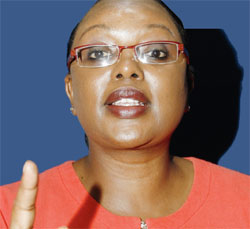By Brenda Kageni
She is one of the few trailblazers for women and for the continent. Holding a doctorate in Public Policy, Dr Esther Mwangi has done numerous projects in environmental and land tenure issues and is now leading the development and implementation of a property rights and tenure strategy at CIFOR. Esther during the interview Photos: Maxwell Agwanda

Trending Now
Popular this week